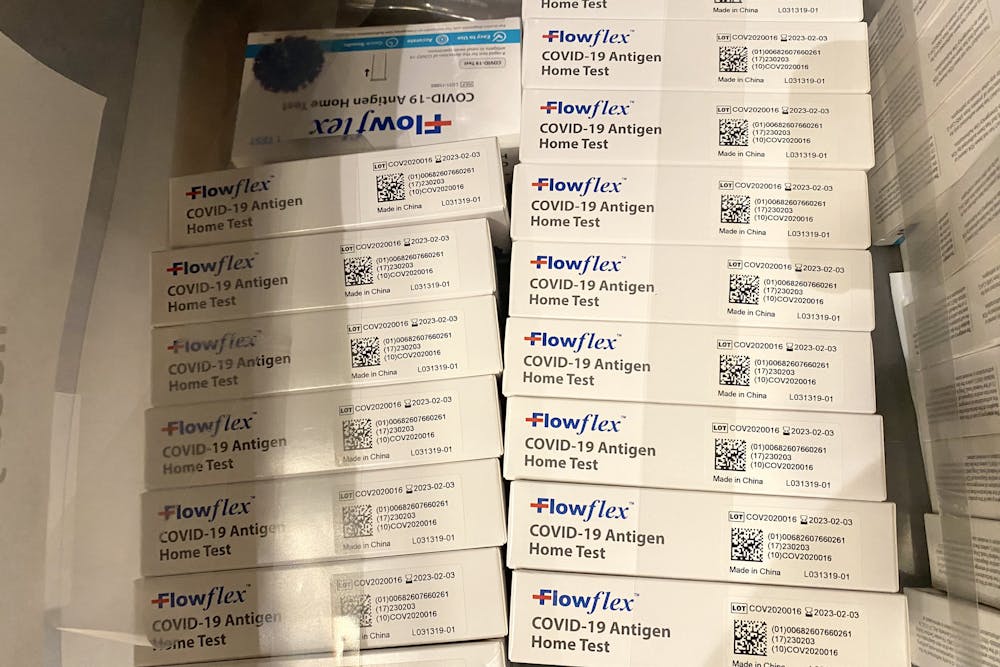Since the start of the semester, rumors have swirled among students that COVID-19 cases are on the rise. However, an email from Derek Ziegler, the assistant director for emergency preparedness, noted that “case numbers have actually declined in each of the last three weeks from a peak in late August” — when the Class of 2027 first arrived on campus.
University policies have continued to cause confusion and frustration among students. As of June 7, 2023, the University lifted the COVID-19 vaccine mandate, closed the campus laboratory certified to conduct campus-wide PCR testing, and stopped tracking COVID-19 cases on its public dashboard. Sick students are still encouraged to test for COVID-19, using free rapid tests provided by McCosh Health Center and residential colleges, and to report positive test results.
Ziegler mentioned that the University is tracking these case numbers internally on an unofficial basis to monitor trends. “The data are not completely accurate, since they mostly rely on self-reported rapid antigen tests,” he wrote to the Daily Princetonian, with emphasis on the decline in cases since August.
Roxana Martínez ’27 tested positive during first-year Orientation. “I had to miss my [Outdoor Action (OA)] trip, which is one of the major bonding experiences of Orientation, and I was worried about how I was going to make new friends,” she wrote in a message to the ‘Prince.’
Per CDC guidelines, individuals who test positive are still required to isolate for at least five days and wear a KN95 mask when around others for days six through 10. Martínez was isolated in her room in Mathey College in over 90 degree heat. “I remember emailing asking for a room switch just for the week, but that was not an option,” she wrote.
She also struggled to obtain meals, which were located in Frist Campus Center and could not be delivered to students’ dorms. “A big problem was that I was extremely lightheaded whenever I walked for long periods of time. I had to rely on my [RCA] and [Peer Academic Advisor] to get [my meals] for me,” she wrote. As her symptoms worsened, she contacted University Health Services (UHS), who she claimed told her to “take Tylenol and isolate.” After throwing up four times in under half an hour, she mentioned she was told “not to come in, just wait it out.”
Irini Daskalaki M.D., the director of global and community health at UHS, wrote in an email to the ‘Prince’ that UHS has continued to treat students with COVID-19 symptoms, though the majority of students with COVID-19 have not required an in-person medical evaluation.
“Interestingly, we have seen more severe illness in students from non-COVID-19 viral illnesses,” Daskalaki wrote.

Some students have expressed confusion surrounding the accuracy of rapid tests. Many of the rapid tests found in residential colleges were past their labeled expiration date. However, Daskalaki explained that all COVID-19 tests provided by the University have had their expiration date extended by the Federal Drug Administration.
While the Biden administration just announced that they are restarting the free at-home COVID test program, others have raised concerns that rapid tests are not as accurate as PCR tests at picking up the new variants. A new CNN report explains that while the performance of rapid tests has not been adversely affected by new variants, many people may be receiving false negative results, because they are testing too early. According to the CDC, individuals who have been exposed to COVID-19 should take a rapid test five days after exposure. UHS is still supplying PCR tests to students who visit with symptoms consistent with COVID-19.
Some students have also expressed concerns that COVID-19 will spread among roommates and suitemates given the University’s isolation policy, which suggests that the well roommate(s) either stay in the room with the roommate who tested positive or find an alternate sleeping space. According to Ziegler, the University has a limited number of isolation spaces for students who cannot isolate in place and is not planning to add more isolation housing at this time.
RCA Nathan Beck ’25 wrote in a message to the ‘Prince,’ “the policy of asking non-COVID roommates to either relocate or risk exposure seems problematic. It also could inadvertently impose a sense of guilt on the infected individual, as their presence might force their roommate to seek alternative accommodation.”

Beck is a contributing Data writer and a staff Copy editor for the ‘Prince.’
According to one student, while some professors have continued to provide Zoom options for students who test positive, the pressure for students to stay on top of their schoolwork, even when they have COVID-19, is immense. The student was granted anonymity due to medical privacy concerns.
The student tested positive during the first week of classes and was worried about falling behind, so they went to classes in-person with a mask, despite the University requirement to isolate themselves during the first five days. They also expressed confusion about the dining options: “I ate alone in the [dining halls], sitting away from people. I was hesitant because I didn’t really know what the policies were like. Will there only be a specific time when I can get food? And do I need someone to help pick my food up?”
Additionally, some professors who have tested positive have offered Zoom classes as they isolate. After testing positive for COVID-19, Michael Hecht, a professor of Chemistry taught his classes via Zoom. He wrote in an email to the ‘Prince’ that it “was fairly straightforward. After all, the past few years gave us lots of experience using Zoom.”
While COVID-19 restrictions have loosened, the virus is here to stay. According to Ziegler, “the University has no plans to reinstate any previous protocols, but continues to encourage members of the campus community to stay up-to-date on COVID vaccines, test when sick, and follow the protocols for positive test results or known exposure.”
Hannah Gabelnick is a contributing News writer for the ‘Prince.’
Please send any corrections to corrections[at]dailyprincetonian.com.








